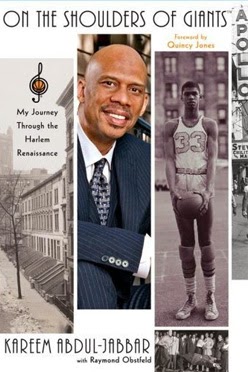It was 1968. I was on a Brookhurst Junior High School eighth grade field trip to the campus of the University of California at Los Angeles when Lew Alcindor walked by.
 |
| From http://kareemabduljabbar.com |
Lew Alcindor. My buddies and I stopped and stared, open-mouthed, wide-eyed. The future Kareem Abdul-Jabbar had a serious look on his face and a huge stack of books under his arm.
Books.
It was an indelible image that had a huge impact on my life.
Abdul-Jabbar was an avid reader and writer even before he began playing college basketball. Now he's a successful author.
Among his books: "Brothers in Arms: The Epic Story of the 761st Tank Battalion, WWII's Forgotten Heroes" with Anthony Walton (2004); "On the Shoulders of Giants: My Journey Through the Harlem Renaissance" with Raymond Obstfeld (2007); and "What Color Is My World? The Lost History of African American Inventors" with Raymond Obstfeld (2012). I look forward to featuring some of Abdul-Jabbar's work in future posts.
 In "Giant Steps," Abdul-Jabbar writes about his first impression of his coach at UCLA, the great John Wooden, who out of respect called him "Lewis."
In "Giant Steps," Abdul-Jabbar writes about his first impression of his coach at UCLA, the great John Wooden, who out of respect called him "Lewis.""I found myself liking Mr. Wooden right away. People would always tell me they cared about me, but I felt Mr. Wooden really meant it. I came of his office knowing I was going to UCLA."
Perhaps it was their mutual interest in books. Each man's fathers, "Hugh" Wooden and "Big Al" Alcindor, had instilled in their sons a lifelong passion for reading.
In "My Personal Best: Life Lessons from an All-American Journey" by John Wooden with Steve Jamison, the coach reflects in a chapter, "The Age of Alcindor," about self-control and poise being fundamental to achieving success. "Lewis had the bearing of an eagle. He also reminded me so much of my own father, Joshua Hugh Wooden."
"Wooden: A Coach's Life" by Seth Davis, opens with:
"The first thing you noticed were the books. Big books, little books, picture books, children's books, art books, religious books, coaching books, sports books, fiction books, science books. Before I walked through the door, they were there to greet me in tall, neat piles in the front hallway. The books were stacked on floors, lined up on tables, piled on desks, jammed into bookcases. The apartment was barely two thousand square feet, yet it seemed that most of it was covered by something that could be read."Wooden was an English teacher before he was a coach. But he was also a lieutenant in the United States Navy providing physical readiness training for naval aviators during World War II. Davis writes:
"After World War II broke out, Wooden could have avoided being drafted because he was a married father and high school teacher, but eventually duty compelled him to enlist in the navy, a little more than a year after the bombing of Pearl Harbor."One of Wooden's assignments was on the campus of the University of North Carolina in Chapel Hill. He also served at other college campuses, at an Iowa preflight school and as an underway watch officer aboard USS Sable (IX-81), an aircraft carrier training ship anchored in Lake Michigan.
Like fellow Sailor Red Auerbach, he never served overseas. In Wooden's case, a bout of appendicitis prevented him from deploying to the carrier USS Franklin (CV-13) in the South Pacific, including off the coast of Samar, Philippines.
"As it turned out, Wooden knew well the man who replaced him aboard the Franklin. He was Freddy Stalcup, a former Purdue football player who was Wooden's fraternity brother in Beta Theta Pi. Several months later, Wooden received a piece of news that left him dumbstruck: Stalcup was working a gun position aboard the Franklin when the ship was struck by a Japanese kamikaze pilot. He was killed along with dozens of other men on board. Had Wooden's appendix not become inflamed, he could very well have lost his life that day."Davis presents a lifetime of detail in nearly 600 pages of Wooden's biography, including details about the Coach's commitment to conditioning and the fast break, Wooden's complicated relationship with Bill Walton, his love of poetry (even on his deathbed), discussions of religion and racism, and the Coach's insights on leadership, including the development of his core values and Pyramid of Success, which reaches a pinnacle in "Competitive Greatness" -- requiring toughness, your best performance, and "real love of a hard battle."
When Wooden passed away in 2010, UCLA issued a statement that included a quote from Kareem Abdul-Jabbar, the former Lew Alcindor, who I saw carrying that armful of books back in 1968:
"It's kind of hard to talk about Coach Wooden simply, because he was a complex man. But he taught in a very simple way. He just used sports as a means to teach us how to apply ourselves to any situation. He set quite an example. He was more like a parent than a coach. He really was a very selfless and giving human being, but he was a disciplinarian. We learned all about those aspects of life that most kids want to skip over. He wouldn't let us do that."
Wooden, known for his pithy words of wisdom, famously said, "What you are as a person is far more important that what you are as a basketball player." He also advised, "Drink deeply from good books."
The dust jacket of "Wooden: A Coach's Life," calls the book, "A provocative and revelatory new biography of the legendary UCLA coach John Wooden, by one of America's top college basketball writers."




















